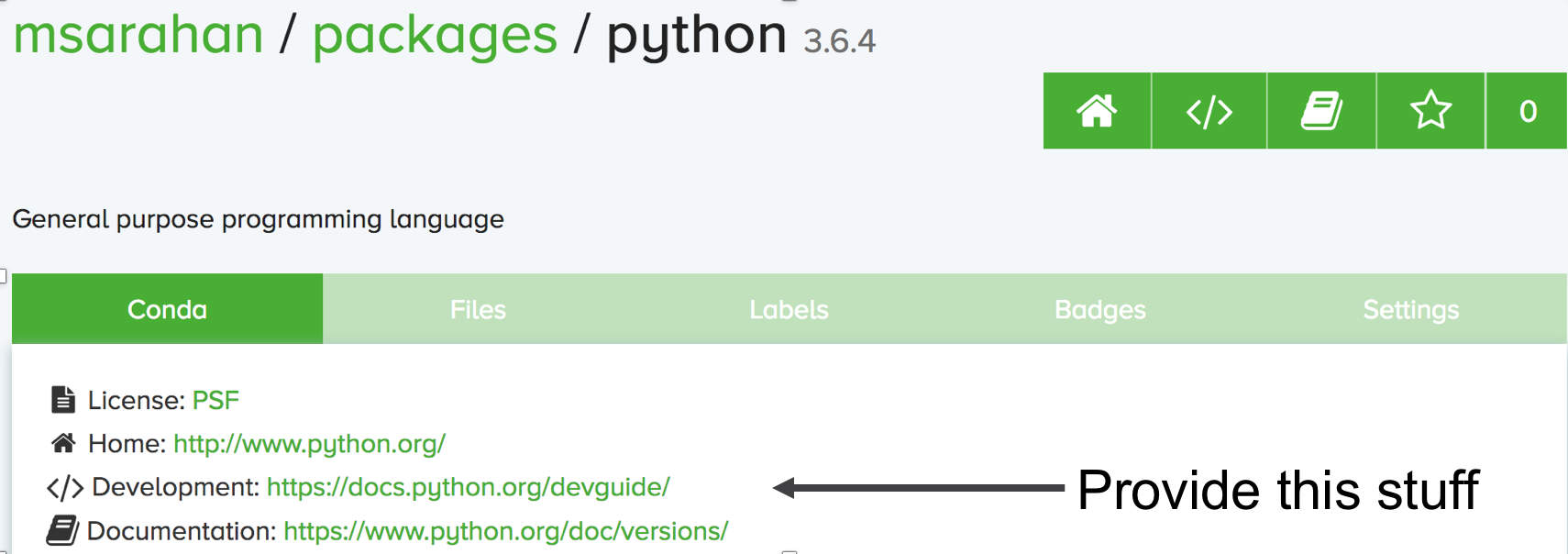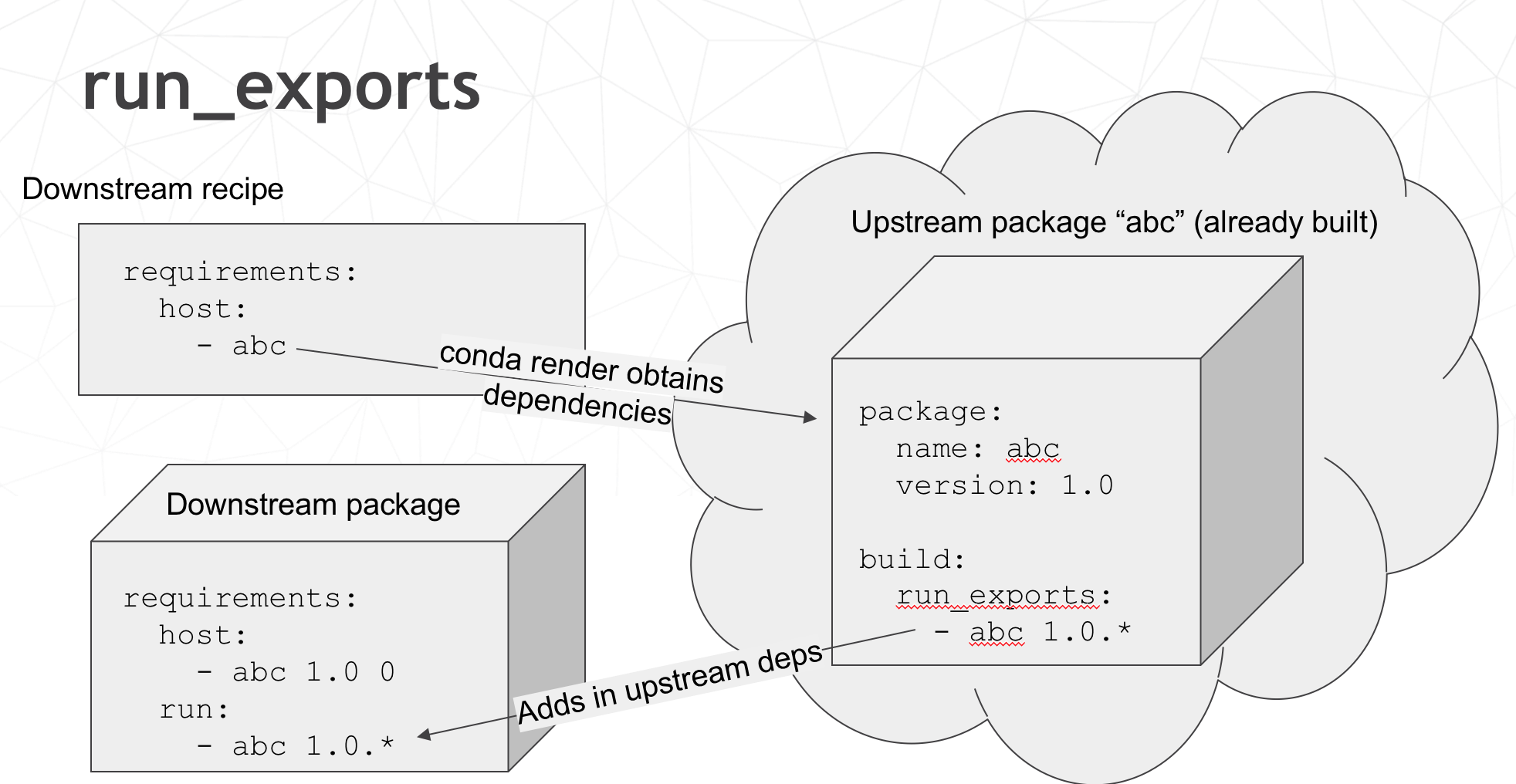Conda Packages¶
Building Conda Packages¶
A package system for anything…
Wheels vs. Conda packages¶
Wheels |
Conda packages |
|---|---|
Employed by pip, blessed by PyPA |
Foundation of Anaconda ecosystem |
Used by any python installation |
Used by conda python installations |
Mostly specific to Python ecosystem |
General purpose (any ecosystem) |
Good mechanism for specifying range of python compatibility |
Primitive support for multiple python versions (noarch) |
Depends on static linking or other system package managers to provide core libraries |
Can bundle core system-level shared libraries as packages, and resolve dependencies |
Introducing conda-build¶
Orchestrates environment creation, activation, and build/test processes
Can build conda packages and/or wheels
Separate project from conda, but very tightly integrated
Open-source, actively developed:
Excercise: let’s use conda-build¶
conda install conda-build
Windows only:
conda install m2-patch posix
All platforms:
cd python-packaging-tutorial/conda_build_recipes
conda build 01_minimum
What happened?¶
Templates filled in, recipe interpreted
Build environment created (isolated)
Build script run
New files in build environment bundled into package
Test environment created (isolated)
Tests run on new package
cleanup
Obtaining recipes¶
Existing recipes (best)
Skeletons from other repositories (PyPI, CRAN, CPAN, RPM)
DIY
Anaconda Recipes¶
Official recipes that Anaconda uses for building packages
Since Anaconda 5.0, forked from conda-forge recipes.
Intended to be compatible with conda-forge long-term
Presently, ahead of conda-forge on use of conda-build 3 features
Conda-forge¶

Numfocus-affiliated community organization made up of volunteers
One github repository per recipe
Fine granularity over permissions
Heavy use of automation for building, deploying, and updating recipes
Free builds on public CI services (TravisCI, CircleCI, Appveyor)
Skeletons¶
Read metadata from upstream repository
Translate that into a recipe
Will save you some boilerplate work
Might work out of the box
(should not assume automatic, though)
conda skeleton¶
conda skeleton pypi:
conda skeleton pypi <package name on pypi>
conda skeleton pypi click
conda skeleton pypi --recursive pyinstrument
conda skeleton cran
conda skeleton cran <name of pkg on cran>
conda skeleton cran acs
conda skeleton cran --recursive biwt
When all else fails, write a recipe¶
Only required section:
package:
name: abc
version: 1.2.3
Exercise: create a basic recipe¶
Source types¶
url
git
hg
svn
local path
Exercise: point your recipe at local files¶
Building packages¶
Lots of ways, but let’s start simple:
build.sh (unix)
bld.bat (windows)
Filenames are of paramount importance here
build.sh: stuff to run on mac/linux¶
It’s a shell script: do what you want
Snapshot files in $PREFIX before running script; again after
Files that are new in $PREFIX are what make up your package
Several useful env vars for use in build.sh: https://conda.io/docs/user-guide/tasks/build-packages/environment-variables.html
bld.bat: stuff to run on windows¶
It’s a batch script: do what you want
Snapshot files in %PREFIX% before running script; again after
Files that are new in %PREFIX% are what make up your package
Several useful env vars for use in bld.bat: https://conda.io/docs/user-guide/tasks/build-packages/environment-variables.html
Exercise: Copy a file into the package¶
Build options¶
number:version reference of recipe (as opposed to version of source code)
script:quick build steps, avoid separate build.sh/bld.bat files
skip:skip building recipe on some platforms
entry_points:python code locations to create executables for
run_exports:add dependencies to downstream consumers to ensure compatibility
Requirements¶

Build requirements¶
Tools to build packages with; things that don’t directly go into headers or linking
Compilers
autotools, pkg-config, m4, cmake
archive tools
Host requirements¶
External dependencies for the package that need to be present at build time
Headers, libraries, python/R/perl
Python deps used in setup.py
Not available at runtime, unless also specified in run section
Run requirements¶
Things that need to be present when the package is installed on the end-user system
Runtime libraries
Python dependencies at runtime
Not available at build time unless also specified in build/host section
Requirements: build vs. host¶
Historically, only build
Still fine to use only build
host introduced for cross compiling
host also useful for separating build tools from packaging environment
If in doubt, put everything in host
build is treated same as host for old-style recipes (only build, no
{{ compiler() }})packages are bundled from host env, not build env
Exercise: use Python in a build script¶
Post-build Tests¶
Help ensure that you didn’t make a packaging mistake
Ideally checks that necessary shared libraries are included as dependencies
Dependencies
Describe dependencies that are required for the tests (but not for normal package usage)
test:
requires:
- pytest
Post-build tests: test files¶
- All platforms:
run_test.pl,run_test.py,run_test.r,run_test.lua
- Windows:
run_test.bat
- Linux / Mac:
run_test.sh
Post-build tests¶
May have specific requirements
May specify files that must be bundled for tests (
source_files)imports:language specific imports to try, to verify correct installationcommands:sequential shell-based commands to run (not OS-specific)
https://conda.io/docs/user-guide/tasks/build-packages/define-metadata.html#test-section
Import Tests¶
test:
imports:
- dateutil
- dateutil.rrule
- dateutil.parser
- dateutil.tz
Test commands¶
test:
commands:
- curl --version
- curl-config --features # [not win]
- curl-config --protocols # [not win]
- curl https://some.website.com
Exercise: add some tests¶
Outputs - more than one pkg per recipe¶
package:
name: some-split
version: 1.0
outputs:
- name: subpkg
- name: subpkg2
Useful for consolidating related recipes that share (large) source
Reduce update burden
Reduce build time by keeping some parts of the build, while looping over other parts
Also output different types of packages from one recipe (wheels)
https://conda.io/docs/user-guide/tasks/build-packages/define-metadata.html#outputs-section
About section¶

Extra section: free-for-all¶
Used for external tools or state management
No schema
Conda-forge’s maintainer list
Conda-build’s notion of whether a recipe is “final”
https://conda.io/docs/user-guide/tasks/build-packages/define-metadata.html#extra-section
Conditional lines (selectors)¶
some_content # [some expression]
content inside
[...]is eval’ednamespace includes OS info, python info, and a few others
https://conda.io/docs/user-guide/tasks/build-packages/define-metadata.html#preprocessing-selectors
Exercise: Limit a Recipe to Only Linux¶
package:
name: example_skip_recipe
version: 1.0
build:
skip: True
package:
name: example_skip_recipe
version: 1.0
build:
skip: True # [not linux]
Intro to Templating with Jinja2¶
Fill in information dynamically
git tag info
setup.py recipe data
centralized version numbering
string manipulation
How does Templating Save You Time?¶
{% set version = "3.0.2" %}
package:
name: example
version: {{ version }}
source:
url: https://site/{{version}}.tgz
Jinja2 Templating in meta.yaml¶
Set variables:
{% set somevar=”someval” %}
Use variables:
{{ somevar }}
Expressions in {{ }} are roughly python
Jinja2 conditionals¶
Selectors are one line only. When you want to toggle a block, use jinja2:
{%- if foo -%}
toggled content
on many lines
{% endif %}
Exercise: use Jinja2 to reduce edits¶
package:
name: abc
version: 1.2.3
source:
url: http://my.web/abc-1.2.3.tgz
{% set version=”1.2.3” %}
package:
name: abc
version: {{ version }}
source:
url: http://w/abc-{{version}}.tgz
Variants: Jinja2 on steroids¶
Matrix specification in yaml files
somevar:
- 1.0
- 2.0
anothervar:
- 1.0
All variant variables exposed in jinja2¶
In meta.yaml,
{{ somevar }}
And this loops over values
Exercise: try looping¶
meta.yaml:
package:
name: abc
version: 1.2.3
build:
skip: True # [skipvar]
conda_build_config.yaml:
skipvar:
- True
- False
meta.yaml:
package:
name: abc
version: 1.2.3
requirements:
build:
- python {{ python }}
run:
- python {{ python }}
conda_build_config.yaml:
python:
- 2.7
- 3.6
meta.yaml:
package:
name: abc
version: 1.2.3
requirements:
build:
- python
run:
- python
conda_build_config.yaml:
python:
- 2.7
- 3.6
Jinja2 functions¶
loading source data:
load_setup_py_data
load_file_regex
Dynamic Pinning:
pin_compatible
pin_subpackage
Compatibility Control:
compiler
cdt
Loading setup.py data¶
{% set setup_data = load_setup_py_data() %}
package:
name: abc
version: {{ setup_data[‘version’] }}
Primarily a development recipe tool - release recipes specify version instead, and template source download link
Centralizing version info is very nice - see also
versioneer,setuptools_scm,autover, and many other auto-version tools
Loading arbitrary data¶
{% set data = load_file_regex(load_file='meta.yaml',
regex_pattern='git_tag: ([\\d.]+)') %}
package:
name: conda-build-test-get-regex-data
version: {{ data.group(1) }}
Useful when software provides version in some arbitrary file
Primarily a development recipe tool - release recipes specify version instead, and template source download link
Dynamic pinning¶
Use in meta.yaml, generally in requirements section:
requirements:
host:
- numpy
run:
- {{ pin_compatible(‘numpy’) }}
Use in meta.yaml, generally in requirements section:
requirements:
host:
- numpy
run:
- {{ pin_compatible(‘numpy’) }}
Pin run req based on what is present at build time
Dynamic pinning in practice¶
Used a lot with numpy:
https://github.com/AnacondaRecipes/scikit-image-feedstock/blob/master/recipe/meta.yaml
Dynamic pinning within recipes¶
Refer to other outputs within the same recipe
When intradependencies exist
When shared libraries are consumed by other libraries
https://github.com/AnacondaRecipes/aggregate/blob/master/clang/meta.yaml
Compilers¶
Use in meta.yaml in requirements section:
requirements:
build:
- {{ compiler(‘c’) }}
explicitly declare language needs
compiler packages can be actual compilers, or just activation scripts
Compiler packages utilize run_exports to add necessary runtime dependencies automatically
Why put compilers into Conda?¶
Explicitly declaring language needs makes reproducing packages with recipe simpler
Binary compatibility can be versioned and tracked better
No longer care what the host OS used to build packages is
Can still use system compilers - just need to give conda-build information on metadata about them. Opportunity for version check enforcement.
run_exports¶
“if you build and link against library abc, you need a runtime dependency on library abc”
This is annoying to keep track of in recipes.

Add host or run dependencies for downstream packages that depend on upstream that specifies run_exports
Expresses idea that “if you build and link against library abc, you need a runtime dependency on library abc”
Simplifies version tracking
Exercise: make a run_exports package¶
Exercise: use a run_exports package¶
Uploading packages: anaconda.org¶
Sign-up:
https://anaconda.org/
Requirement:
conda install anaconda-client
CLI: anaconda upload path-to-package
conda-build auto-upload:
conda config --set anaconda_upload True
Fin¶
Extra slides¶
Source Patches¶
patch files live alongside meta.yaml
create patches with:
diffgit diffgit format-patch
Exercise: let’s make a patch¶
package:
name: test-patch
version: 1.2.3
source:
url: https://zlib.net/zlib-1.2.11.tar.gz
build:
script: exit 1
Builds that fail leave their build folders in place
look in output for source tree in:
*/conda-bld/test-patch_<numbers>/workcdthere
git init
git add *
git commit -am “init”
edit file of choice
git commit -m “changing file because …”
git format-patch HEAD~1
copy that patch back alongside meta.yaml
modify meta.yaml to include the patch
Multiple sources¶
source:
- url: https://package1.com/a.tar.bz2
folder: stuff
- url: https://package1.com/b.tar.bz2
folder: stuff
patches:
- something.patch
- git_url: https://github.com/conda/conda-build
folder: conda-build
Outputs rules¶
List of dicts
Each list must have
nameortypekeyMay use all entries from
build,requirements,test,aboutsectionsMay specify files to bundle either using globs or by running a script
Outputs Examples
https://github.com/AnacondaRecipes/curl-feedstock/blob/master/recipe/meta.yaml
Exercise: Split a Package¶
Curl is a library and an executable. Splitting them lets us clarify where Curl is only a build time dependency, and where it also needs to be a runtime dependency.
Starting point:
https://github.com/conda-forge/curl-feedstock/tree/master/recipe
Solution:
https://github.com/AnacondaRecipes/curl-feedstock/tree/master/recipe